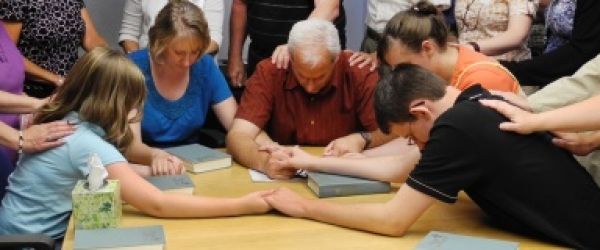
We chose to hand her back to God
By the mother of a SEND missionary — Our daughter moved to the other side of the world. She is 27 years old. She is single. She is living in a third world country doing Muslim ministry and fulfilling a very large dream that she has had for many years of bringing Jesus to an unreached people group.
As parents, my husband and I have often been asked, “How can you let her go? How can you stand to see your daughter in those conditions? How can you send her off knowing the dangers of the culture in which she will be living? How can you let her go ALONE?”
Recently, when SEND International staff talked to my husband about the process of “letting go,” he responded, “Who would do differently if she’s in God’s will? I prayed that at least one (of my kids) would go into missions. We serve an awesome God. I wouldn’t dare be out of his will.”
How DO you let go? How do you watch one whom you have loved, nurtured and spent so many years protecting walk into a powder keg of a world, knowing that even the name of Jesus on her lips is enough to put her in harm’s way?
You don’t.
It’s not about letting go. It’s about handing back. If it was about letting go, I doubt there is a parent on earth who could do it. When it’s about handing back, then it is about putting the hand of your beloved child into the hand of your beloved Father. That is not letting go. That is holding on TIGHT. Holding on to faith. Holding on to truth. Holding on to the knowledge that God is more capable of loving her and caring for her than you could ever hope to be. And holding on to the hope that there will be others in heaven someday because you were willing to hand back one of your most precious treasures.
When our daughter graduated from college with an International Ministries degree, we knew that she would not be staying home. However, we were not prepared for her to be offered a position right out of school in Cairo, Egypt. While my husband saw the advantages of the job offer, I could only see the “what ifs” of sending a young, single, American woman to a Middle Eastern culture.
One night, husband and I took a walk to discuss the decision our 22-year-old daughter was facing. As he spoke about the “wonderful opportunity” that the Lord seemed to be offering her, I stopped, glared at him and said, “Will you STOP pushing this at her?! Why do you keep talking about it in such a glowing way?! I DON’T WANT HER TO GO THERE!” My husband looked at me with tears in his eyes and said, “Believe me, I understand how you feel. But why would we want to stop God’s leading in her life? We have always prayed that he would use our children for the Kingdom.” In that moment, and together, we chose to hand her back.
And she chose to go.
Our daughter was in Egypt during the 2011 revolution. We spoke to her on the phone as looting was going on in the streets below her. We heard the gunshots and we experienced the racing hearts of parents who had no control. But we also prayed with her, quoted verses, and witnessed the strength, faith, and courage of the young woman whom God was shaping into the one who left last month to serve him long term.
God knew what He was doing. Cairo prepared her for what she is doing now. And while he was shaping her for her future, he was also lovingly shaping us. We filed that experience away in our “faith file,” and we pull it out even now on the days that we struggle. Those days come. But he has proven faithful.
This past week we talked to our daughter over Skype. She had two fans blowing on her because it was so hot. She was telling us about her war with the cockroaches in her new home. But she was smiling. She was content. And she was glowing as she recounted the story of two Muslim women who had just accepted Christ.
Our children don’t belong to us, folks. They never have. We need to hand them back.
We appreciate the sacrifices that families make when their loved ones serve as missionaries. Prayer can help bridge the gap. Download a free bookmark with daily themes to help you pray for your missionary family members.
Additional Posts




